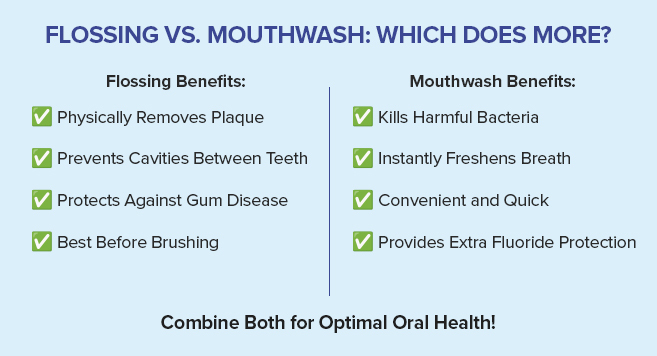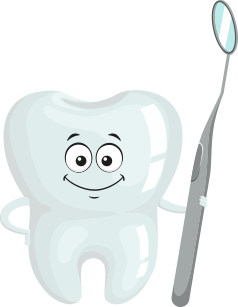Flossing vs. Mouthwash: Which One Does More?

The daily oral care debate often boils down to this simple question: flossing vs. mouthwash, who wins the battle for better oral health?
Mouthwash quickly kills bacteria and freshens your breath. Flossing physically removes plaque stuck between teeth, significantly reducing the risk of cavities and gum disease.
At Radiant Dental Care, one of the best dental hospitals in Chennai, patients often ask us, “Which one matters more?” The truth is both play distinct, important roles: flossing is unmatched for plaque removal, and mouthwash excels at bacterial control and freshness. However, if you’re pressed for time and must choose, flossing typically offers greater overall oral health benefits.
Ready to understand why, and how you can combine both for optimal results? Dive deeper into this blog, guided by insights from the best dentists near you!
Flossing vs. Mouthwash : Comparing Benefits
Let’s break down the benefits of flossing and mouthwash in various aspects of oral care.
1. Plaque Removal and Cavity Prevention
- Flossing removes plaque directly from between teeth, where cavities often form first.
- Mouthwash reduces the overall bacterial count but cannot eliminate physical plaque.
Winner: Flossing
2. Gum Disease Prevention
- Flossing targets the gum line and interdental spaces, disrupting plaque that leads to gum irritation.
- Mouthwash can reduce bacterial inflammation but works better when used with flossing.
Winner: Flossing
3. Ease of Use
- Mouthwash is quick, convenient, and can be done almost anywhere.
- Flossing takes more time and requires technique.
Winner: Mouthwash
4. Breath Freshening
- Mouthwash provides instant freshness and odor-neutralizing agents.
- Flossing helps prevent long-term bad breath but doesn’t offer immediate freshness.
Winner: Mouthwash
5. Whitening and Cosmetic Appeal
- Mouthwash may include whitening agents like hydrogen peroxide.
- Flossing offers no cosmetic improvement in color.
Winner: Mouthwash
What Research Says About Flossing and Mouthwash!
Here’s what dental experts and clinical studies say about flossing and mouthwash!

ADA & Clinical Studies
The American Dental Association (ADA) provides clear guidance: flossing is essential for removing plaque in areas toothbrushes cannot reach, and mouthwash should be considered a supplemental tool.
Recent studies report:
- Daily flossing reduces the risk of interproximal caries by over 40%.
- Chlorhexidine mouthwash significantly reduces gingival bleeding and inflammation, but long-term reliance without mechanical plaque removal is not advised.
- Fluoride mouthwash can lower the incidence of cavities, especially in individuals prone to caries.
Real-World Dental Advice
Dental professionals across the world, including those from the best dental hospital in Chennai, consistently emphasize the importance of an integrated approach. Patients who rely solely on mouthwash while skipping floss often experience gum sensitivity, bleeding, or plaque buildup—conditions that could be avoided with a daily flossing routine.
Best Flossing Practices for Maximum Effect
To get the most out of flossing, follow these expert-recommended tips:
- Use 18 inches of dental floss, winding the majority around each middle finger.
- Insert the floss gently between your teeth—don’t snap or force it.
- Curve it into a C shape against one tooth and slide it up and down to clean beneath the gum line.
- Repeat this motion for every tooth, using a clean section of floss each time.
Tips for Success:
- For those with limited dexterity or braces, floss picks or water flossers may be easier.
- Floss before brushing to allow fluoride from toothpaste to penetrate between teeth more effectively.
How to Use Mouthwash in the Right Way?
Using mouthwash isn’t as simple as swishing for a second or two. To maximize its benefits:
- Select the right type: Choose based on your needs—antibacterial (for gum disease), fluoride (for cavity protection), or cosmetic (for breath only).
- Follow proper timing: Swish for at least 30–60 seconds to ensure effectiveness.
- Avoid rinsing with water immediately afterward.
- Wait at least 30 minutes after use before eating or drinking to allow ingredients to work.
Some users benefit from prescription-strength mouthwashes recommended by dentists, especially for issues like oral ulcers, dry mouth, or post-surgical recovery.
Flossing vs. Mouthwash : Common Challenges
Here are a few challenges with both mouthwash and flossing!
Flossing Challenges:
- Tight dental contacts or misaligned teeth can make flossing difficult.
- People with sensitive gums or dental work like bridges may find flossing painful.
- Consistency is often an issue due to lack of time or motivation.
Mouthwash Challenges:
- Alcohol-based rinses can cause stinging or dryness, especially in patients with xerostomia.
- Overuse can disrupt natural oral flora.
- Misuse (such as not swishing long enough) leads to limited benefits.
Do You Really Need Both?
Absolutely. Think of flossing and mouthwash as teammates, not competitors.
- Flossing eliminates the physical buildup.
- Mouthwash reduces microbial presence and freshens breath.
Skipping either one results in an incomplete oral hygiene strategy. Just like brushing, they both play a non-negotiable role.
When to Prioritize One Over the Other?
Prioritize Flossing When:
- You have visible plaque or tartar between teeth
- You experience bleeding or tender gums
- You’re prone to interproximal cavities
Prioritize Mouthwash When:
- You struggle with chronic bad breath
- You’re undergoing orthodontic treatment
- You want additional cavity protection with fluoride
- You have inflammatory oral conditions
In either case, tailor your approach based on feedback from your dentist.
Expert Dentists View on Flossing vs. Mouthwash
At Radiant Dental Care, dentists advocate a holistic oral care approach. Our professional consensus aligns with global dental associations: brushing alone isn’t enough, and neither is using mouthwash as a standalone solution.
The team stresses that flossing targets the root of interdental issues, while mouthwash enhances oral defenses, especially when facing gum infections, bad breath, or dietary concerns. Regular assessments and routine check-ups help determine what combination works best for each individual.
Patients with braces, dental implants, or gum recession benefit greatly from custom routines, which are thoughtfully designed by professionals at Radiant Dental Care.
A Balanced Routine Recommended By Our Expert Dentists for Optimal Oral Health
A proper sequence improves overall effectiveness:
- Floss – Remove plaque and debris from between teeth.
- Brush – Clean all surfaces of the teeth and apply fluoride.
- Mouthwash – Rinse with an appropriate oral rinse to kill bacteria and protect enamel.
Following this three-step routine once or twice daily improves gum health, minimizes decay, and boosts oral hygiene outcomes.
Final Verdict: Which One Does More?
If you’re forced to choose just one due to time or access, flossing edges out mouthwash in terms of health impact. The removal of plaque and debris can’t be replicated chemically. That said, mouthwash still plays a crucial role, especially in freshening breath and targeting bacteria that brushing and flossing may miss. The best results come from pairing both methods, just like how good oral hygiene depends on a complete, consistent effort, not shortcuts.
For personalized recommendations and expert evaluations, connect with the best dentist near me to design a hygiene plan that fits your lifestyle and dental health.
Need help building a consistent dental care routine that works? The team at Radiant Dental Care is just a consultation away.
Frequently Asked Questions:
Q1. Is flossing better than using mouthwash?
Ans. Flossing is more effective at removing plaque between teeth, while mouthwash complements by reducing bacteria and freshening breath.
Q2. Can mouthwash replace flossing in my routine?
Ans. No, mouthwash cannot replace flossing. They serve different purposes and work best when used together.
Q3. How often should I floss and use mouthwash?
Ans. Floss once daily and use mouthwash as recommended—usually once or twice a day depending on your dental needs.
Q4. What happens if I skip flossing but use mouthwash daily?
Ans. You may still face issues like plaque buildup, gum disease, or cavities between teeth, as mouthwash cannot remove debris physically.
Q5. Which mouthwash is best for daily use?
Ans. Opt for an alcohol-free, antibacterial mouthwash with fluoride for daily use, especially if you have sensitive gums or dry mouth.

 +91 9513446186
+91 9513446186
